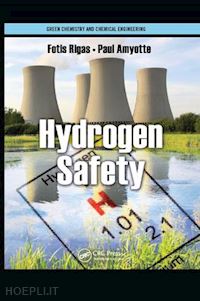Hydrogen Safety highlights physiological, physical, and chemical hazards associated with hydrogen production, storage, distribution, and use systems. It also examines potential accident scenarios that could occur with hydrogen use under certain conditions. The number of potential applications for hydrogen continues to grow—from cooling power station generators to widespread commercial use in hydrogen fuel-cell vehicles and other fuel-cell applications. However, this volatile substance poses unique challenges, including easy leakage, low ignition energy, a wide range of combustible fuel-air mixtures, buoyancy, and its ability to embrittle metals that are required to ensure safe operation. Focused on providing a balanced view of hydrogen safety—one that integrates principles from physical sciences, engineering, management, and social sciences—this book is organized to address questions associated with the hazards of hydrogen and the ensuing risk associated with its industrial and public use. What are the properties of hydrogen that can render it a hazardous substance? How have these hazards historically resulted in undesired incidents? How might these hazards arise in the storage of hydrogen and with its use in vehicular transportation? The authors address issues of inherently safer design, safety management systems, and safety culture. They highlight hydrogen storage facilities —which pose greater hazards because of the increased quantities stored and handled—and the dangers of using hydrogen as a fuel for transport. Presented experiments are included to verify computer simulations with the aid of computational fluid dynamics (CFD) of both gaseous and liquefied hydrogen. The book also provides an overview of the European Commission (EC) Network of Excellence for Hydrogen Safety (HySafe) and presents various case studies associated with hydrogen and constructional materials. It concludes with a brief look at future research requirements and current legal requirements for hydrogen safety.











